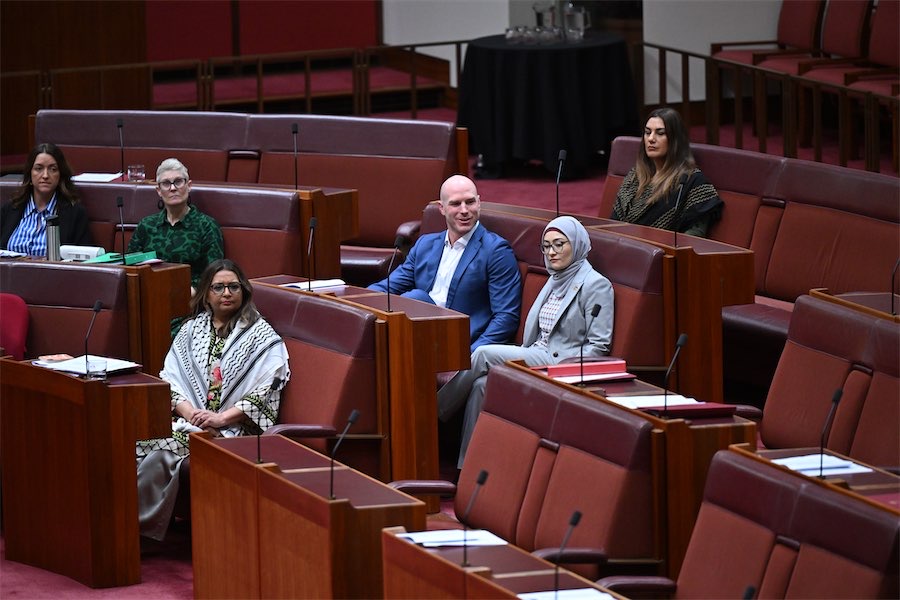
The omnipresence of the internet in our global lives has changed several centuries of legal thinking. There is now a willingness to pass laws in Australia that have a global reach, writes legal columnist HUGH SELBY.
Following the recent knife attack upon a cleric during a church service in Sydney, images of that attack quickly showed up on the internet, including on X (the social media platform formerly known as Twitter).

Elon Musk “owns” X. Asked by Australia’s Esafety Commissioner to take down those images he demurred, though – from some media reports – X may have blocked those images from being seen in Australia using geoblocking.
The limitation of that technology is that it can be bypassed by those with a knowledge of virtual private networks (VPN).
There’s a range of opinions about whether such images should be freely available. At one extreme is: “Free speech cannot co-exist with censorship”. At the other is: “These images distress because of their content. They are also an incitement to violence, terrorist violence in particular. For those reasons they must not be available”.
The Esafety Commissioner, Julie Grant, has started proceedings in the Federal Court (that’s the same Commonwealth court in which both Lehrmann and Roberts-Smith brought their ill-fated defamation proceedings) to force X to take down the images.
It’s a twist of fate that Ms Grant, who has held public policy and tech industry positions in the US, once worked for Twitter.
X is an American company, operating from America. Mr Musk is an American. By what means can an Australian law, the Online Safety Act 2021, being applied in an Australian court, have any effect upon the overseas company and its non-Australian owner?
Rapidly evolving law on ‘extraterritoriality’
Not so long ago it would have been thought that Australian authorities, intent on bringing X and Mr Musk to heel, would need to take action in the American courts, using American laws, against the American company and its owner.
While it is true that X has “assets” in the US (which can be seized to enforce any judgment), and may not have them in Australia, there are still the problems of finding appropriate American law, best choice of court and lawyers, and dealing with all the procedural requirements.
In such a fight X would have the hometown advantage.
The omnipresence of the internet in our global lives has changed several centuries of legal thinking. There is now a willingness to pass laws in Australia that have a global reach.
Those laws contain tests about the connection between Australia and the overseas companies and non-Australians that allegedly have done things that damage the interests of Australia, its businesses and citizens. Those “connection” tests are becoming ever easier to satisfy.
Practically, if the Esafety Commissioner can demonstrate the necessary “connection”, then orders can be made by the Federal Court against X. Thereafter there is the separate legal problem of how to enforce those orders.
Extraterritoriality in criminal justice
The reach of Australian law beyond our borders is termed “extraterritorial” jurisdiction. Some aspects of that, particularly in the criminal law system, are well known. Examples include:
- War crimes by Australian nationals in overseas combat theatres against non-combatants. It is claimed that such conduct occurred in Afghanistan. One former soldier faces trial in 2025. The Roberts-Smith defamation trial was an unsuccessful attempt to refute those criminal conduct allegations as made against the plaintiff, a living VC holder;
- War crimes overseas by a person who was not then an Australian but has later made Australia their home. There is just one example, Ivan Polyukhovich, charged under our War Crimes Act, and acquitted by an Adelaide jury in May 1993 after a nine week trial, for his alleged mass murder of Jews in the Ukraine. After the war he had migrated to Australia;
- Sex crimes by Australian nationals overseas, such as pedophile conduct or facilitating forced sexual servitude; and,
- Exporting drugs from overseas to Australia by an Australian, such as the recent claim that an Australian, now based in Cambodia, is allegedly exporting prohibited drugs to Australia.
If the alleged criminal is in Australia then they can be arrested and brought to trial. If they are overseas then getting them back here depends upon our extradition arrangements with the country where they are found.
A current, much publicised example of extradition is the action by the US government to extradite Australian Julian Assange, Wikileaks founder, from London to the US to stand trial for his publication many years ago of “secret US documents”.
Extraterritoriality in civil cases
As the X spat shows, the focus now is the extraterritorial reach of our consumer and privacy laws. Those are civil, not criminal matters.
First, we need to know that since 1986 it is certain that both the Commonwealth and the states have the power (under s 2(1) of both the Commonwealth and United Kingdom Australia Acts ): “…to make laws … that have extra-territorial application.”
Second, that power is constrained by other principles. For example, showing respect for the sovereignty of other nations, a state will not pass laws which purport to operate in or regulate conduct in other jurisdictions.
Chief Justice of the High Court Kiefel and Justice Gageler (now the chief justice) stated in BHP Group Ltd v Impiombato [2022] HCA 33 at paragraph 23, that the common law (that is judge-made law) “presumption against extraterritorial operation” of statutes was better termed a “presumption in favour of international comity” which means “mutual benefit”. This rephrasing was prescient of what was to happen within the next year.
From time to time countries have passed laws, or their courts have taken action, to prohibit attempts to have another country’s law “operate” within their borders.
For example, in 1984 the English Court of Appeal stopped Laker Airways from suing Midland Bank in the US. Laker Airways sought to use the extraterritorial operation of the US’s Sherman and Clayton Acts in proceedings in the US in respect of Midland Bank conduct that had occurred in England.
The Plaintiff Bank successfully argued that, as the conduct sought to be impugned occurred in England, it would be unconscionable that they should be exposed to an antitrust suit based on an extra-territorial application of the Sherman and Clayton Acts which an English court should not recognise. Midland Bank plc v Laker Airways [1986] QB 689)
Nevertheless, the approaches that seemed fit enough for purpose in a pre-digital world no longer suffice. As NSW Chief Justice Bell commented in April 2023: “Global activity transcends national borders in a way that invites far more frequent legislative and regulatory response” (Spigelman Oration).
The following month the Commonwealth Administrative Appeals Tribunal decided that a US-based company, Clearview AI, was subject to our Privacy Act because the repeated collection by its webcrawler of images from Australian internet servers to put in its image library was, alone, sufficient to establish that it was carrying on a business in Australia for the purposes of the extra-territorial application test in the Privacy Act.
Clearview AI had no physical presence in Australia and derived no revenue from any commercial operations in Australia, but its “image harvesting” was the foundation of its business. (Clearview A1 v AIC [2023] AATA 1069 at paragraphs 99 -101, 200). There’s a useful guide to that decision here. Clarifying the “reach” of our consumer protection laws is a late 2023 High Court decision, Karpik v Carnival plc [2023] HCA 39, about how those laws protect Australians and others who travel on foreign-registered cruise liners.
Remember the early, scary days of covid and the Ruby Princess docked in Sydney in 2020.
Ms Karpik and her husband were passengers. She survived. He died. She brought a case against the cruise company in our Federal Court, and was joined by many others – including non-Australians who had signed up to terms and conditions that were solely of benefit to the cruise company and deleterious for those passengers.
The High Court, in a unanimous five-judge decision, held that: “Parliament is prescribing that a corporation that does business in Australia (as the cruise ship business did) should be required, if it uses standard terms in a consumer or small business contract, to meet Australian norms of fairness, irrespective of whether the standard terms are in a contract made in Australia or one made overseas” [paragraph 40].
Can X be controlled?
Which brings us back to the reach of the Online Safety Act, which provides, in section 23, subsection 2, “This Act extends to acts, omissions, matters and things outside Australia.”
That there is a “connection” to Australia follows from the Sydney location of the stabbing, the involvement of Australians in that event and its aftermath, and the use of X by Australians in their everyday lives.
“Abhorrent violent material” and its removal is governed by a number of sections dealing with blocking requests and demands by the Esafety Commissioner. Unfortunately, the definition of that conduct in section 9 is wholly circular:
“ (1) For the purposes of this Act, material that depicts abhorrent violent conduct means material that is:
(a) audio material; or
(b) visual material; or
(c) audio-visual material;
that records or streams abhorrent violent conduct.”
What’s more it has no criteria or perspectives: “abhorrent” to whom? Right thinking people? Who are these “right thinking people”? Does it include psychological violence, such as engendering fear by “coercive control”? Now that we know the effects of concussion upon our contact sports legends does it follow that an “on-field” injury (violent) causing concussion (abhorrent) is conduct caught by this definition? If so, will livestreams of matches need to have a delay so that on-field injuries are deleted from the video feed?
Don’t be surprised if ,when the Esafety Commisioner’s case comes to court for a final hearing (the steps so far have been short-term only), much is said, especially by X, as to the nonsense of section 9.
They might even get away with recasting that famous line from “The Castle” as, “this law lets the Esafety Commissioner dictate what will and will not be seen according to the vibe of the thing”.
If the Commissioner gets over that hurdle then whether “geoblocking” by X is sufficient raises the ambit of section 12, that, “material is removed from a social media service… if the material is neither accessible to, nor delivered to, any of the end-users in Australia using the service”. If material is accessible to any end user in Australia via a VPN then it has not been “removed”.
Enforcing an Australian court decision in an US court
Which leaves the question of whether an American court will enforce orders made by our Federal Court that require X to take down or in some other way modify the images of the stabbing.
No doubt there are skilled lawyers employed by the Commonwealth who are advising on that process. It’s not easy.
Suffice to note that this year the American Law Institute has published a text which sets out the content of a proposed US Federal Law that would impose uniform standards for recognition and enforcement of foreign judgments throughout the US.
The proposed law authorises negotiation of agreements with foreign countries (such as Australia) for reciprocal enforcement of each others’ judgments… The legislation… would be consistent with the needs of a legal and commercial community ever more engaged in international transactions and their inevitable concomitant, international litigation. (See here).
“International mutual benefit” can have substance. Where there’s a will (as shown in the Law Institute proposal) there’s a way – eventually.
Former barrister Hugh Selby’s free podcasts on “Witness Essentials” and “Advocacy in court: preparation and performance” can be heard on the best known podcast sites.
Who can be trusted?
In a world of spin and confusion, there’s never been a more important time to support independent journalism in Canberra.
If you trust our work online and want to enforce the power of independent voices, I invite you to make a small contribution.
Every dollar of support is invested back into our journalism to help keep citynews.com.au strong and free.
Thank you,
Ian Meikle, editor









Leave a Reply